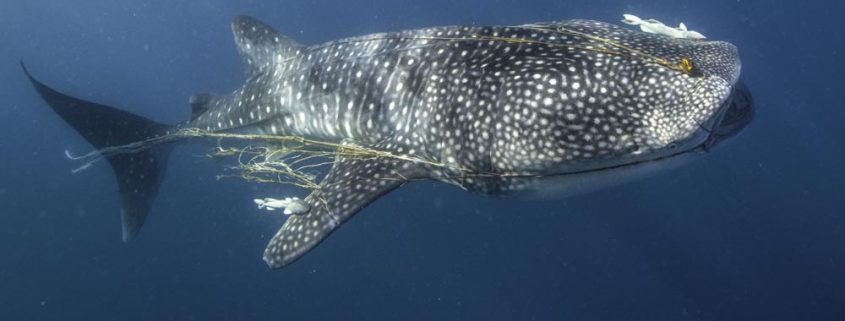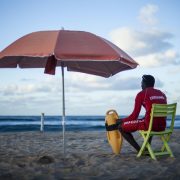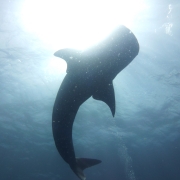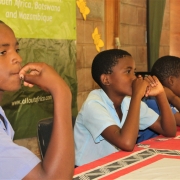What do fishermen, robot sharks and volunteers have in common off the coast of Tofo, Mozambique and how are they coming together to save the world’s biggest fish?
All Out Africa volunteer-collected data recently contributed to a paper our collaborating scientists and I authored looking at the importance of Mozambican coastal water to whale sharks and the potential threats to whale sharks in these waters.
In this paper 15 whale sharks satellite-tagged off the coast of Tofo had their movement patterns analysed. This showed that some travelled great distance (up to 2737km) with tags staying on an average of 27 days, sharks moved an average speed of about 28km a day. Our fastest shark moved over 70km in 1 day and our slowest just 2.6km per day! Whale sharks are big animals that have the capacity to move great distances, but most of the tagged sharks stayed within 1000km of where they were tagged. In fact one individual, MZ-607, whose tag stayed on for 56 days, only moved 205km from where tagging occurred! All this shows us that, with most sharks staying within Mozambican coastal waters, Mozambique’s coastline is very important for whale sharks.
The real whale sharks were then compared to computerized ‘model sharks’ that had been generated on a computer from general movement info of the whale shark….would the model sharks move in the same way as the actual whale sharks had? Or would there be a difference between the model sharks and the real sharks….helping us to uncover what else might be affecting the choices the whale sharks made in their movements? What drives a whale shark, is it random movement within its capacity, if not what is it moving towards? The real whale sharks spent significantly more time in cooler, shallow water with higher chlorophyll-a concentrations than the model sharks. With high chlorophyll-a indicating productive waters full of food, this suggests feeding is driving their movements in Mozambican waters. Not so surprising maybe as we are all driven by our stomachs sometimes!
So what does that mean for whale shark conservation: are the coastal waters of Mozambique a safe place for whale sharks to be spending a lot of time? Or are there hidden threats off of Tofo that could put our whale sharks at risk? One of the things our volunteers do is GPS area-usage mapping….not just for wildlife but for humans impacting the ocean too! For this paper we used data from 1323 boat-based volunteer surveys of area-usage. One of the things we record is gill-net fishing activity. Gill-netting involves using large nets, typically 20-200m in length and 5-8m deep, in relatively shallow waters to catch shoals of fish. These nets are often put out in the ocean, weighted down at the bottom and left unattended, with the fishermen only returning many hours later to check for any catch. With nets commonly laid perpendicular to the shore (sticking out from shore), transient marine megafauna moving along the coast can easily become caught in the nets. I have pulled turtles, guitarfish and rays from these unattended nets myself – sometimes with a happy outcome, and sometimes not. So, are these gill-nets a threat to whale sharks? Well, larger animals are more easily caught in a net with a larger mesh-size as it more easily gets caught around their fins. With the gill-nets in Mozambican coastal waters typically having a mesh size of 5-20cm, whale sharks are at risk of being caught in the larger-meshed nets. If they get caught in the nets whale sharks can’t usually get out, so they carry on swimming with the net attached and gradually, due to friction of the water and bioaccumulation of algae adding weight, the nets saw through the whale shark’s fins, amputating them.
So, the coastal waters off of Tofo, Mozambique are important to whale sharks. Whale sharks are likely coming here to feed. And the increasing use of gill-nets in Mozambican coastal waters is a threat to whale sharks. Gill-nets pose a risk to whale shark survival and whale shark conservation efforts in Mozambique. Gill-net use stands to negatively impact the substantial economic benefits brought by sustainable whale shark tourism in Tofo, Mozambique, and potentially other areas of the world where the human-wildlife conflict of whale shark versus gill-net may occur.
If you are interested to read the full paper the link is below and it is open-source so free to read for anyone interested!
https://peerj.com/articles/4161/?utm_source=soye2018&utm_medium=email&utm_content=article_list
Written by Katie Reeve-Arnold, Director of Research, All Out Africa Marine Research Centre (Tofo Mozambique)











Leave a Reply
Want to join the discussion?Feel free to contribute!